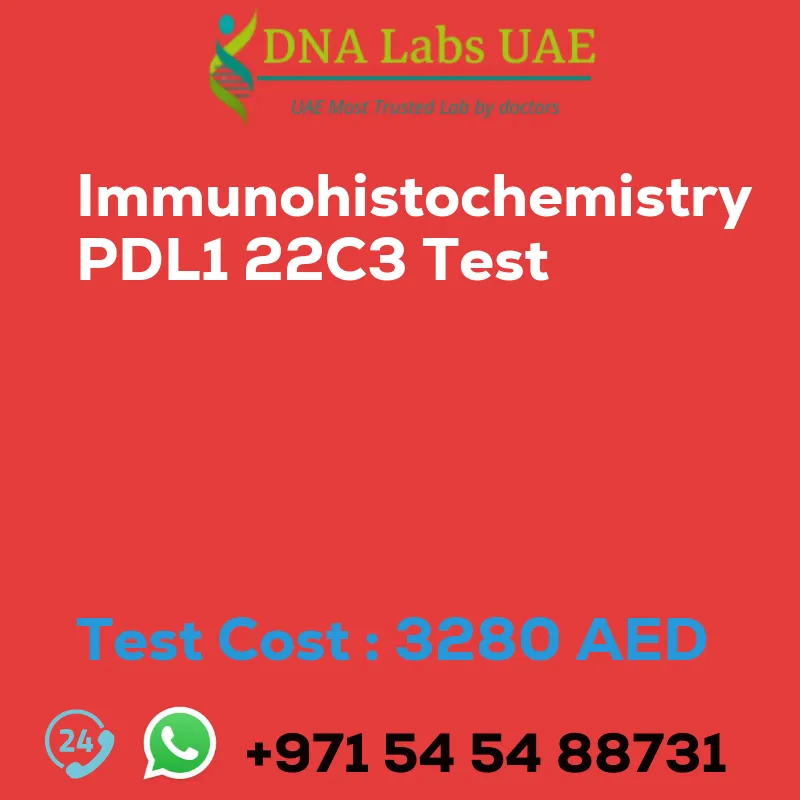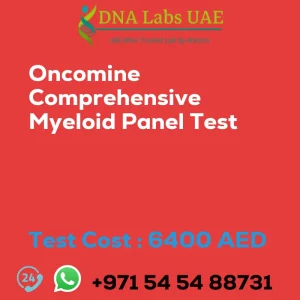IMMUNOHISTOCHEMISTRY PDL1 22C3 Test
Test Cost: 3280.0 AED
Test Name: IMMUNOHISTOCHEMISTRY PDL1 22C3 Test
Components: IMMUNOHISTOCHEMISTRY
Price: 3280.0 AED
Sample Condition: Submit tumor tissue in 10% Formal-saline OR Formalin fixed paraffin embedded block. Ship at room temperature. Provide a copy of the Histopathology report, Site of biopsy and Clinical history.
Report Delivery: Sample Daily by 6 pm; Report Block: 5 daysTissue Biopsy: 5 days Tissue large complex: 7 days
Method: Immunohistochemistry
Test type: Cancer
Doctor: Oncologist
Test Department: HISTOLOGY
Pre Test Information: Provide a copy of the Histopathology report, Site of biopsy and Clinical history.
Test Details
The PD-L1 22C3 test is an immunohistochemistry (IHC) test used to assess the expression of programmed death-ligand 1 (PD-L1) in tumor tissues. PD-L1 is a protein that is expressed on the surface of cancer cells and interacts with the programmed cell death protein 1 (PD-1) receptor on immune cells, suppressing the immune response against the tumor. The PD-L1 22C3 test involves staining tumor tissue samples with a specific antibody that recognizes PD-L1. The antibody is labeled with a chromogen or fluorescent dye, which allows visualization of PD-L1 expression under a microscope. The stained tissue sections are then examined by a pathologist to determine the percentage of tumor cells expressing PD-L1 and the intensity of staining.
The PD-L1 22C3 test is commonly used to guide treatment decisions in certain types of cancer, particularly in patients who may benefit from immune checkpoint inhibitors, such as pembrolizumab. PD-1 inhibitors block the interaction between PD-L1 and PD-1, thus enhancing the immune response against the tumor. The results of the PD-L1 22C3 test can help oncologists determine the likelihood of response to PD-1 inhibitors and may be used to select patients who are more likely to benefit from this type of immunotherapy. However, it is important to note that PD-L1 expression is not the only factor influencing response to PD-1 inhibitors, and other biomarkers and clinical factors are also considered in treatment decisions.
| Test Name | IMMUNOHISTOCHEMISTRY PDL1 22C3 Test |
|---|---|
| Components | IMMUNOHISTOCHEMISTRY |
| Price | 3280.0 AED |
| Sample Condition | Submit tumor tissue in 10% Formal-saline OR Formalin fixed paraffin embedded block. Ship at room temperature. Provide a copy of the Histopathology report, Site of biopsy and Clinical history. |
| Report Delivery | Sample Daily by 6 pm; Report Block: 5 daysTissue Biopsy: 5 days Tissue large complex : 7 days |
| Method | Immunohistochemistry |
| Test type | Cancer |
| Doctor | Oncologist |
| Test Department: | HISTOLOGY |
| Pre Test Information | Provide a copy of the Histopathology report, Site of biopsy and Clinical history. |
| Test Details |
The PD-L1 22C3 test is an immunohistochemistry (IHC) test used to assess the expression of programmed death-ligand 1 (PD-L1) in tumor tissues. PD-L1 is a protein that is expressed on the surface of cancer cells and interacts with the programmed cell death protein 1 (PD-1) receptor on immune cells, suppressing the immune response against the tumor. The PD-L1 22C3 test involves staining tumor tissue samples with a specific antibody that recognizes PD-L1. The antibody is labeled with a chromogen or fluorescent dye, which allows visualization of PD-L1 expression under a microscope. The stained tissue sections are then examined by a pathologist to determine the percentage of tumor cells expressing PD-L1 and the intensity of staining. The PD-L1 22C3 test is commonly used to guide treatment decisions in certain types of cancer, particularly in patients who may benefit from immune checkpoint inhibitors, such as pembrolizumab. PD-1 inhibitors block the interaction between PD-L1 and PD-1, thus enhancing the immune response against the tumor. The results of the PD-L1 22C3 test can help oncologists determine the likelihood of response to PD-1 inhibitors and may be used to select patients who are more likely to benefit from this type of immunotherapy. However, it is important to note that PD-L1 expression is not the only factor influencing response to PD-1 inhibitors, and other biomarkers and clinical factors are also considered in treatment decisions. |








